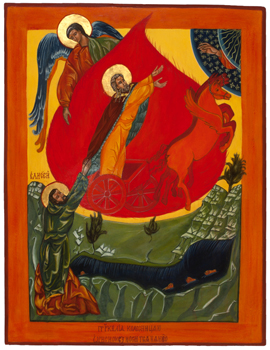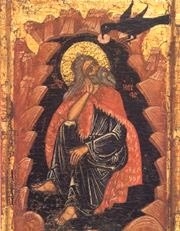When Seeing isn't Believing
By Debie Thomas
For Sunday February 15, 2015
Lectionary Readings (Revised Common Lectionary, Year B)
2 Kings: 2:1-14
Psalm 50
2 Corinthians 4:3-6
Mark 9: 2-10
Well then, what? If you're anything like me, you've asked God for a no-holds-barred revelation at some point in your life, and the yearning that has prompted you to ask is a yearning for certainty. A deep desire to move out of confusion and ambivalence, into a safe and absolute knowing.
"Be careful what you ask for," is what this week's Old Testament reading might say in response. A whirlwind. Fiery chariots. Flying horses. Magic cloaks. Let's face it: the story of Elijah's "translation" in 2 Kings is all about God's unveiled glory. If anything, the story is so "glorious" that it strains modern credulity.
You can imagine the movie script, can't you? The wizened prophet Elijah, in his garment of hair and his leather belt, parting the Jordan River with a flick of his cloak. His bereft student, Elisha, standing on the shore, pleading for a double-portion of his master's spirit. Elijah promising nothing, only encouraging Elisha to keep his eyes wide open, his face turned skyward. Elijah ascending to heaven in a whirlwind, accompanied by chariots of fire.
Elijah's Assumption: Russian Folk Icon. |
To say the obvious right from the get-go: I don't know what to make of the miraculous elements in this story The interpretation I grew up with (God doesn't hold back when it comes to honoring his faithful servants, and providing for their successors) is lovely, and no doubt true. But it's rather tame, given the pyrotechnics that run through this narrative. After all, we're talking weather gone whacky, and horses on fire. Human beings on the knife edge of language, cognition, and maybe even sanity. Truisms and theological treatises aside, is there any way we can enter into this story? Make it ours?
The only way I can think of is to focus my attention, not on the miraculous, but on the ordinary. In this case, on the ordinary human who stands at the sidelines of the story, witnessing the unveiling of God. What does Elisha discover as he listens, beholds, and wonders in the presence of pure miracle? Does he discover the certainty I long for so often?
2 Kings tells us that Elijah calls Elisha as his heir and acolyte when Elisha is still a young man, dutifully plowing his father's fields. Directed by God, Elijah walks out amongst the muddy fields and smelly oxen, wraps his cloak around Elisha's shoulders — a gesture so heavy with love and prophetic foreboding, it makes my eyes fill — and calls him away to a new vocation.
Fast forward seven or eight years. Elisha has more or less become Elijah's shadow, following his teacher around out of love, admiration, and a keen eagerness to learn anything Elijah will teach him. As the time for their parting draws near, both Elijah and the established community of prophets try to help Elisha say goodbye.
"I need to take the next step of this journey alone," Elijah tells his acolyte three separate times. "No, I will not leave you," Elisha stubbornly insists, clinging all the harder. "Do you know the Lord is about to take your master?" the other prophets ask Elisha, hoping he'll accept the inevitable before it's too late. "Shut up!" is Elisha's gracious reply.
 |
The Fiery Ascent of Elijah. |
I'm not sure how to apply divine whirlwinds to my life, but I resonate with the human drama at the heart of this story. Like Elisha, I have had — and continue to have — gifted and loving mentors in my life. Mentors who've watched over my growing up from girlhood to womanhood, mentors who've guided my spiritual life, mentors who've encouraged and honed my writing. I wouldn't be alive and functional today, if it weren't for them.
But also like Elisha, I've never let a mentor go without a fight. I've always hung on first, in grief, uncertainty, and fear. Fear that I'm not ready, fear that I'll fail, fear that saying goodbye will hurt far too much to bear.
For Elisha, this moment at the River Jordan is far more than a sad parting between friends. He's at a vocational crossroads, and both his future and his identity are at stake. Can he trust his calling in the absence of Elijah's reassuring presence? Can he learn to decipher the voice of God on his own, without an experienced translator at his side? Can he, a loyal and eager follower, become a leader instead? Can he bid farewell to a sheltered adolescence, and face the hardships of spiritual adulthood alone?
These are questions I wrestle with, too, so I stand at the shore with Elisha and watch Elijah's departure with a full heart. Looking back across the centuries that separate me from this story, I have to wonder: what did the drama accomplish? The fire, the wind, the chariots? Were the fireworks for Elijah, headed anyway to heaven and all its cosmos-altering wonders? Or was Elisha the one who needed to understand, right from the beginning of his career, that God's glorious unveilings aren't be-alls and cure-alls? Elisha saw glory, that's for sure. Absolute "proof," absolute radiance. But his response was neither certitude nor joy. He tore his clothes and grieved.
I know few scenes in the Bible more poignant than the one that ends this story. As quickly as the vision came, it departed again. There was no afterglow, no surge of prophetic authority or knowledge as Elisha lay grieving in the dust. Only silence. Only loss. Only an old, tattered cloak, waiting to be noticed.
 |
The Prophet Elijah. |
I imagine that when Elisha finally saw that piece of cloth, he held it to his face and inhaled deeply. I imagine he stood at the shore for a long time, gripping that last remnant of his teacher's presence in his hands and wondering what to do, where to go, who to become. "Where is the Lord, the God of Elijah?" he cried aloud in desolation. No one answered; the heavens were closed. I imagine the future looked more precarious than ever.
This isn't a "happy" story, as stories go. But it convinces me, once again, that the Bible contains truth, no matter what my modern skepticism makes of its miracles. Why? Because it rings true. It shows me true things, things that save me even when I'd prefer to see something prettier, easier, and more radiant.
It's not the vision that saved Elisha. The vision was glorious, and no doubt as the years passed and his grief faded, he remembered it as one of the truly great events of his life. But it didn't save him, and it didn't propel him forward.
Elisha's salvation came in the long silence after the glory. It came when he still had no idea whether Elijah's "double portion" rested on him, or not. It came when he picked up the cloak, approached the river, and did his grief-stricken best to follow in his beloved master's footsteps. Imagine battered faith, trembing faith, scorched faith. The faith that remains after the chariots leave.
Elisha knelt and extended his hands. At the first touch of the cloak to the river, the waters parted.Image credits: (1) HermitBrother.Blogspot.com; (2) ApocalyseIcons.com; and (3) Iconograms.org.





